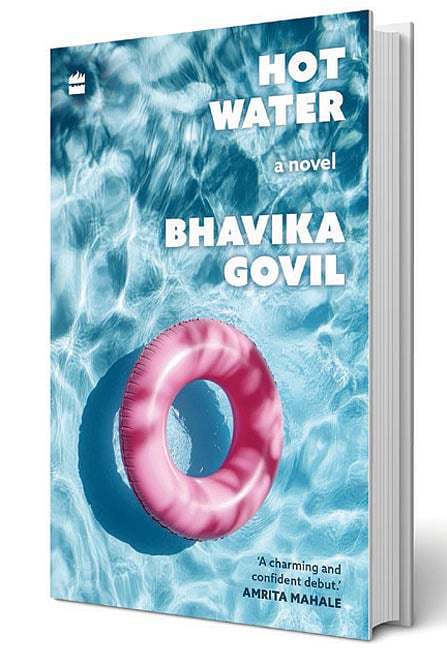Rhythms of Silence

BHAVIKA GOVIL’S Hot Water is a quiet triumph of observation and emotional nuance, a debut that announces a distinct literary voice—one that is attentive to the invisible hinges of domestic life, the pauses between spoken words, and the unarticulated fears and desires that ripple beneath the surface of a family navigating the undercurrents of secrets that each of the members deals with.
At first glance, the story is deceptively simple: a widow and her two children—nine-year-old Mira and 14-year-old Ashu—spend a long, sweltering summer in Delhi. Their lives seem to orbit the unpredictable mood swings of their eccentric mother. Yet in the hands of Govil, this premise unfurls into something richly layered and deeply affecting. Through the alternating perspectives of the siblings, the reader is offered a lens into a household suspended in emotional heat—like the titular hot water, simmering quietly before it boils.
Govil makes a bold and intelligent narrative choice by channelling much of the novel’s interiority through Mira and Ashu, both of whom are trying to make sense of a world that doesn’t explain itself. This narrative device—of adult emotional life seen through the eyes of children—is a literary lineage she shares with Arundhati Roy, whom she quotes at the start of the book. Like Estha and Rahel in The God of Small Things, Mira and Ashu are not reliable narrators in the conventional sense, but they are precise chroniclers of mood, gesture, and undercurrents. They listen not only to what is said, but also to what is withheld. The contrast of the mother’s confessional narrative answers the questions in the minds of the children and unravelling of personal secrets and unresolved trauma.
AIming High
20 Feb 2026 - Vol 04 | Issue 59
India joins the Artificial Intelligence revolution with gusto
Mira, in particular, is drawn with a delicate, lyrical precision—her observations shaped by a child’s syntax but glinting with poetic insight. Ashu, older and edging into adolescence, carries a heavier burden: the weight of disillusionment, the stirrings of sexual awareness, and a growing impatience with the flawed adults around him. Together, their voices compose a quiet duet of longing, hurt, bewilderment, and fragile resilience— each echoing the other in their search for sense and shelter in a world that offers neither easily.
Hot Water is not only about big revelations or narrative twists; it is about the subtle shifts in relationships, and the unseen labour of children also trying to understand adults, and the ache of growing up in emotional ambiguity.
The chapter titles—Plunge, Surface, Float, Swim, Sink, Choke, Flail, and Breathe—mirror both the literal arc of a near-drowning incident in a swimming pool and the emotional undercurrents of the siblings’ summer. They evoke the physicality of learning to navigate water, while metaphorically charting the psychological turbulence of childhood—tentative beginnings, moments of calm, struggles to stay afloat, loss of control, and finally, a hard-won gasp of clarity or acceptance. The sea, ever-present in Govil’s imagination, becomes a metaphor for growing up: vast, unpredictable, and filled with invisible depths.
In a literary landscape that often privileges spectacle or trauma, Hot Water offers something rarer: a deeply interior, elegantly written story that captures the heat of a family in quiet crisis. Govil has written a debut that listens closely to the frequencies of childhood, to the rhythms of silence, and to the invisible ways that love and disappointment pass between people. It is an impressive, quietly confident book—one that lingers long after the last page is turned.

